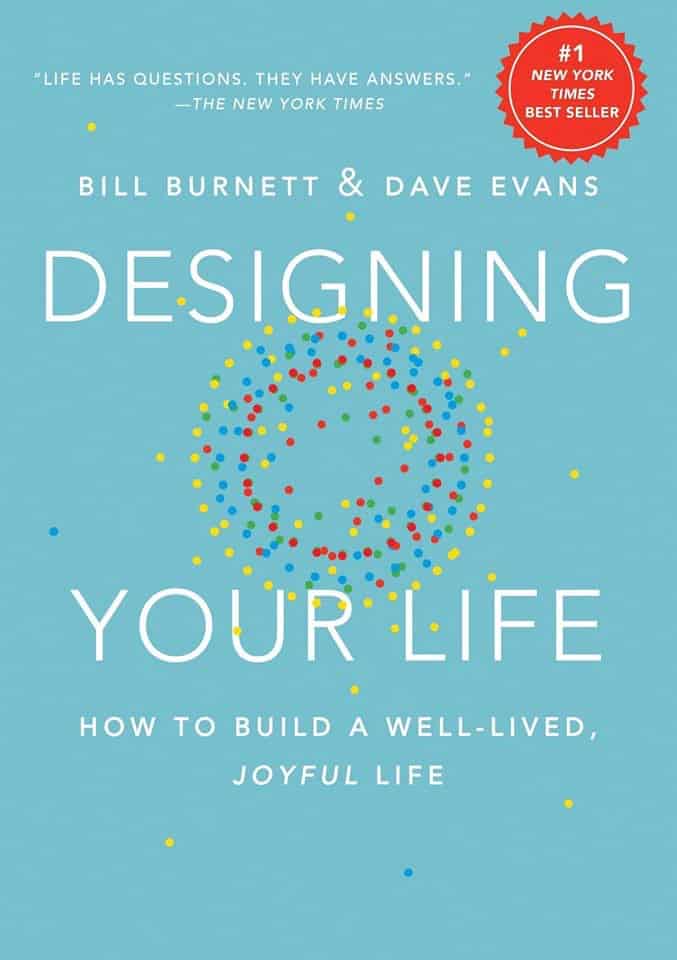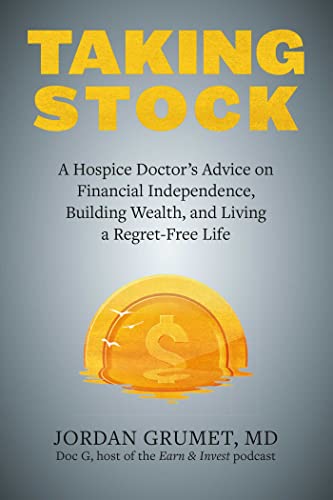Designing my life, part one: Building a compass

After advocating Designing Your Life to several friends, two of them suggested that we work through the book's exercises together. One of those friends is Kim, my long-term girlfriend. The other is Craig, a college classmate. I thought it might be fun to share some of these exercises as we complete them over the next couple of months.
Because I want to respect the intellectual property of the authors, I'm not going to describe the exercises exactly. Instead, I'll provide a vague overview and then discuss my own answers. (And, when it makes sense, I'll also include answers from my friends.)
The power of non-monetary investments
The Get Rich Slowly summer of books continues! Today's excerpt comes from Jordan Grumet, better known in the FIRE world as Doc G, host of the Earn & Invest Podcast. When he's not talking about money, Jordan is a real-life hospice doc. His new book, Taking Stock, offers lessons from the dying to the living.
The following is from Taking Stock by Jordan Grumet with permission from Ulysses Press. Copyright © 2022 by Jordan Grumet. This passage has been edited to be more readable on the web.

Resources for Writing a Will?
Last Friday, I drove from Corvallis to Portland to help my cousin, Duane. Duane has been living with throat cancer for several years now, but in recent months things have grown worse. It feels like he's preparing for the end. And that means he's packing up his apartment (where he's lived for 21 years!) to move someplace smaller.
We spent all of Friday afternoon sorting through his office. This was a challenge because (like most Roths) Duane is messy (and a self-proclaimed hoarder). Duane and I packed boxes and boxes of collectible card games, ancient coins, books on Greek and Roman history, and outdated computer games.
While we packed, we talked. Duane is my cousin, yes, but he's also my best friend. Because we're family and friends, I feel like we share a deep connection. We can call out each other's bullshit without hurting feelings. We can sing each other's praises without becoming obsequious. Most of all, we can talk about nerdy stuff like Magic: The Gathering, The Great British Baking Show, the ignorance of history in supposedly "historical" television dramas, and so on.
Drama in real life: Moving Mom to memory care
Today, I did the second-hardest thing I've ever had to do: I took away Mom's cat.
Mom's assisted living facility called last Thursday. "We strongly encourage you to consider moving your mother to memory care," the director told me. "I know we talked about this a year ago, and at that time you and your family decided she wasn't ready. We think she's ready now. She's refusing her meds. She's refusing to eat. She's wandering. She's more confused than ever."
I phoned my brother, Jeff, who has handled the bulk of Mom's care since she moved to Happy Acres a decade ago. "What do you think?" I asked.
Drama in real life: Making planned gifts before death
My mother's health has been declining over the past few months, and it's produced a wee bit of year-end financial drama in our family. (The word "drama" is a bit of an exaggeration. Maybe it's produced some year-end financial consternation?)
As long-time readers will recall, my mother has been in assisted living for more than a decade now. She lives a mellow life filled with television, her pet cat, and a regular routine. Because she has cognitive problems, it's difficult for her to communicate. The doctors call her "non-verbal", and they can't explain the cause. She cannot form complete sentences (sometimes two words is tough!), and it seems as if she cannot formulate complex thoughts. It's a mystery to everyone.
Today — at this very moment — my brother is driving my mom to the emergency room. It's her third visit in six weeks, and it's always the same issue: vomiting, dehydration, confusion. During the previous two episodes, a few days of hospital rest helped her, and she returned to the assisted living facility feeling better (and actually able to carry on a basic conversation, like you might have with a two-year-old).
Accentuate the positive, eliminate the negative

When Kim and I go to bed each night, we spend time casually browsing Reddit on our iPads. It's fun. Mostly.
She and I enjoy sharing funny animal videos with each other (from subreddits like /r/animalsbeinggenisuses, /r/happycowgifs, and /r/petthedamndog). Kim dives deep into /r/mapporn and /r/documentaries. I read about comics and computer games and financial independence.
But here's the thing. After browsing Reddit for thirty minutes or an hour, I'm left feeling unsatisfied. In fact, I'm often in a bad mood. After browsing Reddit, I have a negative attitude. My view of the world has deteriorated. Why? Because for all the fun and interesting things on Reddit, it's also filled with a bunch of crap.
The flywheel of wealth (and the importance of patience)

His name is Dave. A retired Naval officer, he’s written two novels and about to publish his third. His books (thrillers in the style of Dan Brown and John Grisham) have been well received and even won awards, yet he’s still a relative unknown in the competitive world of fiction.
Her name is Michal. She’s a residential and commercial painting contractor in central Ohio. She’s a natural artist, a trait she inherited from her father and passed on to her daughter. She’s truly gifted, yet has struggled to grow her young business.
His name is Rob. He wants to achieve financial freedom at a young age. Yet, fresh out of college, he has mountains of debt. He makes a good salary, but most of it goes to paying school loans and everyday expenses. He manages to save and invest $100 a month, but feels like he’s making little progress.
Thes
Couple goals: How couples can create a shared plan for the future

J.D.'s Intro
Last December, I took a trip to Europe with my cousin Duane. Before I left, I received email from a GRS reader named Matthias. "If you come through Switzerland, let me know," he said.The stars aligned so that Matt was able to join us for several hours on a train across the Alps. He brought Swiss chocolate and a bottle of whisky. As we talked -- and became pleasantly buzzed -- he told me about how he and his wife tackle couple goals together via five-year plans for their future.
"I love this idea," I told him. "Will you write about it for Get Rich Slowly?" He did. This is Matt's story about creating a shared vision as a couple. Enjoy!
Financial freedom and the value of time

Note from J.D.
Last October, I had a chance to read an advance copy of Grant Sabatier's new book, Financial Freedom, which was just released this morning. I liked it. I loved parts of it. In fact, the second chapter of Financial Freedom inspired my article about how time is more valuable than money.Today, I'm pleased to present a (heavily edited) excerpt from that second chapter. Here's Sabatier on why time is more valuable than money -- and why you can and should retire early. (Links and photos are from me. Everything else is from the book. Note, however, I've heavily edited this chapter in order to abridge it and to make it more readable in blog format.)
If some ninety-year-old rich dude offered you $100 million to trade places with him, would you do it? Of course not. Why? Because time is more valuable than money.
Thinking in Bets: How to make smarter decisions
I read a lot of books. Nearly every book has some nugget of wisdom I can take from it, but it's rare indeed when I read a book and feel like I've hit the mother lode. In 2018, I've been fortunate enough to read two books that I'll be mining for years to come.
The first was Sapiens, the 2015 "brief history of mankind" from Yuval Noah Harari. I finished the second book yesterday: Thinking in Bets by Annie Duke. Duke is a professional poker player; Thinking in Bets is her attempt to take lessons from the world of poker and apply them to making smarter decisions in all aspects of life.
"Thinking in bets starts with recognizing that there are exactly two things that determine how our lives turn out," Duke writes in the book's introduction. Those two things? The quality of our decisions and luck. "Learning to recognize the difference between the two is what thinking in bets is all about."